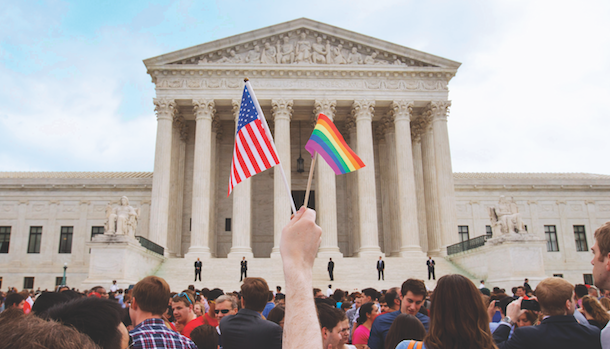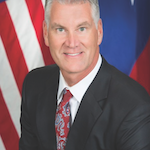
OutSmart at 25: Bending Toward Justice
The fight for LGBTQ rights is far from over.
By Daryl Moore
Twenty-two years ago, OutSmart welcomed me to its pages and published my first LeftOut column.
For 10 years, publisher Greg Jeu gave me a monthly platform to write about issues that engaged me, enraged me, and frequently perplexed me.
I wrote my last LeftOut column in 2006, when I felt like I’d run out of fresh things to say. Last month, Greg messaged me to ask if I wanted to write something for OutSmart’s 25th-anniversary issue. I said yes without hesitation.

I said yes because I welcome the opportunity to write about what’s changed and what hasn’t in the last 25 years, and why it’s as important as ever to stay engaged and to continue the fight for equality.
When I wrote my first column in 1996, everything was different. State laws criminalizing oral and anal sex between consenting adults were still on the books because of Bowers v. Hardwick, the 1986 case in which the Supreme Court held that the Constitution did not confer “a fundamental right to engage in homosexual sodomy.” President Bill Clinton signed the Defense of Marriage Act (DOMA) in 1996, denying federal recognition of same-sex marriages. That same year, the military discharged almost 900 service members for violating “Don’t Ask, Don’t Tell,” the military’s policy that prohibited gay, lesbian, and bisexual individuals from serving openly.
 Much has changed since 1996. In 2003, the Supreme Court overruled Bowers with Lawrence v. Texas and invalidated sodomy laws nationwide. In 2011, President Barack Obama certified the end of “Don’t Ask, Don’t Tell.” In 2013, the Supreme Court held in United States v. Windsor that DOMA’s provision of allowing the term “spouse” to apply only to marriages between a man and a woman was unconstitutional. Then, in 2015, the Supreme Court’s Obergefell v. Hodges ruling declared that the right of same-sex couples to marry is fundamental under the U.S. Constitution.
Much has changed since 1996. In 2003, the Supreme Court overruled Bowers with Lawrence v. Texas and invalidated sodomy laws nationwide. In 2011, President Barack Obama certified the end of “Don’t Ask, Don’t Tell.” In 2013, the Supreme Court held in United States v. Windsor that DOMA’s provision of allowing the term “spouse” to apply only to marriages between a man and a woman was unconstitutional. Then, in 2015, the Supreme Court’s Obergefell v. Hodges ruling declared that the right of same-sex couples to marry is fundamental under the U.S. Constitution.
In 1996, I was a thirty-something single young lawyer who was not really all that out. Today, I’m a fifty-something married and out elected official in Harris County, Texas. The relative speed at which we have been moving toward equality has, in many respects, been mind-blowing. Even the labels used by our community have changed: GLBT to LGBT, to LGBTQ, to LGBTQI, or simply to LGBT+.
If you had asked me in 1996, when I started writing my OutSmart column,whether we would see the undoing of DOMA, the repeal of “Don’t Ask, Don’t Tell,” and marriage equality in my lifetime, I would have responded without hesitation: “No way.” And while I’m thrilled about our progress, this is no time to take our foot off the gas. It might seem like morning in America for our community, but there could well be more dark days ahead. If we assume there’s nowhere to go but up, we’re sunk.
And there is historical precedent for my anxiety. Let’s talk about race relations and reproductive freedom.
The Civil Rights Act of 1964, the Voting Rights Act of 1965, and the Fair Housing Act of 1968 are all more than a half-century old. Undoubtedly, all three helped kick-start our nation’s remarkable progress with racial justice. But still, the fight continues.
Just last year, two different federal courts found that the State of Texas had acted with “racially discriminatory intent” and with a “discriminatory purpose” against minority voters in congressional redistricting and in enacting voter-ID laws. Federal courts have found intentional discrimination by the State of Texas eight times since 2011.
More than 50 years after the passage of the Civil Rights Act, America’s courts are finding that the promise of racial justice remains unfulfilled.
And let’s talk about women’s reproductive freedom. In 1965, the Supreme Court held in Griswold v. Connecticut that married couples had a constitutional privacy right that includes legal access to contraception. Eight years later, in Roe v. Wade, the high court
held that a woman’s constitutional right to privacy includes the right to terminate a pregnancy. After these two seminal cases, many women thought their march for reproductive freedom was over. Hardly.
Last year, President Trump rolled back the birth-control mandate and allowed employers and insurers to refuse to provide contraception for religious or moral reasons. Every bill that Congress considered to roll back the Affordable Care Act called for defunding Planned Parenthood. And today, all but 10 states have imposed at least one major abortion restriction: onerous regulations on abortion clinics, mandated counseling to dissuade women from having abortions, a mandated waiting period before an abortion, a requirement of parental involvement before a minor obtains an abortion, or a prohibition on the use of state Medicaid funds to pay for medically necessary abortions.
The unfinished fight for racial justice and reproductive freedom reveals that although we now have marriage equality, the fight for full equality has just begun. Today, while we can legally marry, only 20 states have employment non-discrimination laws that cover sexual orientation and gender identity. Fifty percent of the LGBTQ population lives in states that allow employment discrimination based on sexual orientation or gender identity. And 51 percent live in states that allow public-accommodation discrimination or the right to refuse LGBTQ individuals entry into stores, restaurants, hotels, etc.
In other words, while we can legally marry, half of us live in states where we can be fired at work if we put our wedding pictures out on our desks. And more than half of us live in states where we can be turned away at a restaurant or hotel because of who we are.
In a commencement address at Wesleyan University in 1964—the same year the Civil Rights Act outlawed discrimination based on race—Martin Luther King Jr. reminded new graduates that “the arc of the moral universe is long, but it bends toward justice.” Even with the passage of the Civil Rights Act at hand, King knew that the fight for racial justice had just begun.
So has the fight for full equality.
This article appears in the April 2018 edition of OutSmart magazine.










